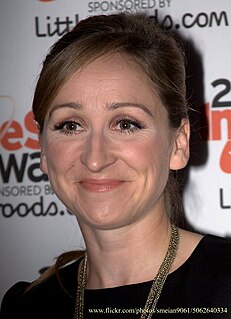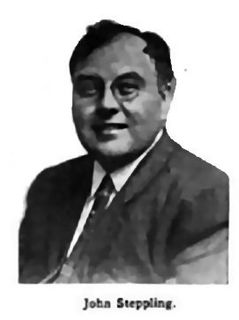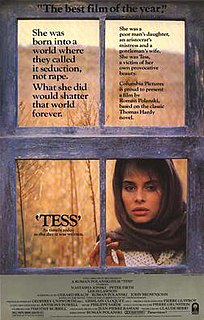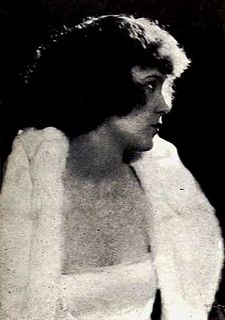
Tess of the d'Urbervilles: A Pure Woman Faithfully Presented is a novel by Thomas Hardy. It initially appeared in a censored and serialised version, published by the British illustrated newspaper The Graphic in 1891, then in book form in three volumes in 1891, and as a single volume in 1892. Though now considered a major 19th-century English novel, even Hardy's fictional masterpiece, Tess of the d'Urbervilles received mixed reviews when it first appeared, in part because it challenged the sexual morals of late Victorian England. Tess was portrayed as a fighter not only for her rights, but also for the rights of others.
Hans Matheson is a Scottish actor and musician. In a wide-ranging film and television career he has taken lead roles in diverse films such as Doctor Zhivago, Sherlock Holmes, The Tudors, Tess of the D'Urbervilles, Clash of the Titans and 300: Rise of an Empire. In addition to acting, Matheson sings and plays guitar, violin and harmonica, and released an album of his songs in 2019.
Alec or Aleck is a Scottish form of Alex. It may be a diminutive of the given name Alexander or a given name in its own right. Notable people with the name include:

James D'Arcy is an English actor. He is known for his portrayals of Howard Stark's butler, Edwin Jarvis, in the Marvel Cinematic Universe television series Agent Carter and the 2019 film Avengers: Endgame, and murder suspect Lee Ashworth in the second season of the ITV series Broadchurch. D'Arcy also co-starred as Colonel Winnant in Christopher Nolan's war movie Dunkirk (2017).
Allan Leigh Lawson is an English actor, director and writer.
The Awakening may refer to:

Charlotte Bellamy is an English actress. She is known for her long-running role as Laurel Thomas in the ITV soap opera Emmerdale. Her other television roles include Sue Taylor in EastEnders (1997) and Harriet Potter in The Broker's Man (1998), before joining Emmerdale in 2002. She won the British Soap Award for Best Actress in 2017.

John Steppling was a German-American silent film actor.
Vanity Fair may refer to:

James Gordon was an American silent film actor. He appeared in 127 films between 1911 and 1935. He also directed 4 films between 1913 and 1915, including the 1915 film The New Adventures of J. Rufus Wallingford. He was born in Pittsburgh, Pennsylvania, and died in Hollywood, California from post-surgical complications.
Jo Woodcock is an English television, film and stage actress. Although active since 2000, Woodcock came into prominence following her critically acclaimed performances as Alice in the television drama Torn in 2007, and as Liza-Lu Durbeyfield in the television series Tess of the d'Urbervilles in 2008. She appeared as Celia Radley in Dorian Gray, the film adaptation of Oscar Wilde's novel The Picture of Dorian Gray, in 2009.
The Other Woman may refer to:

Tess of the D'Urbervilles is a 4-hour BBC television adaptation of Thomas Hardy's 1891 book of the same name. The script is by David Nicholls. It tells the story of Tess Durbeyfield, a low-born country girl whose family find they have noble connections.

Tess of the d'Urbervilles is a 1924 American silent drama film starring Blanche Sweet and Conrad Nagel. It was directed by Sweet's husband, Marshall Neilan. The film is the second motion picture adaptation of the 1891 novel by Thomas Hardy, which had been turned into a very successful 1897 play starring Mrs. Fiske. In 1913, Adolph Zukor enticed Mrs. Fiske to reprise her role in a film version which is now considered lost. The 1924 version is also considered lost.

Tess is a 1979 drama film directed by Roman Polanski and starring Nastassja Kinski, Peter Firth, and Leigh Lawson. It is an adaptation of Thomas Hardy's 1891 novel Tess of the d'Urbervilles. The screenplay was written by Gérard Brach, John Brownjohn, and Roman Polanski. The film received positive critical reviews upon release and was nominated for six Academy Awards, including Best Picture, winning three for Best Cinematography, Best Art Direction and Best Costume Design.
Tess is a feminine given name, typically a diminutive form of Theresa or Esther.

Dorothy Farnum(1900-1970) was an American screenwriter noted for her work at Metro-Goldwyn-Mayer during the silent era and later in Britain during the 1930s.

Tess of the d'Urbervilles is a 1913 American silent drama film based upon the Thomas Hardy 1891 novel of the same name and was one of the first feature films made. It was directed by J. Searle Dawley, released by Famous Players Film Company and stars Mrs. Fiske, reprising her famous role from the 1897 play. An Adolph Zukor feature production after securing the services of top American actress Mrs. Fiske.
Vanity Fair is a 1915 silent film drama directed by Eugene Nowland and Charles Brabin and starring Mrs. Fiske, a renowned Broadway stage actress. The Edison Company produced and released the film. Mrs. Fiske had starred in the 1899 hit Broadway play Becky Sharp based on William Thackeray's 1848 novel of the same name. Here she recreates the role for Edison's cameras. This film marks Mrs. Fiske's second feature film as she had starred in Tess of the d'Urbervilles for Adolph Zukor in 1913. Despite the popularity of Vanity Fair, Mrs. Fiske never made another motion picture.
Tess of the D'Urbervilles is a three-hour television serial made by London Weekend Television, first broadcast in 1998, adapted for television by Ted Whitehead and directed by Ian Sharp and starring Justine Waddell, based on Thomas Hardy's 1891 book Tess of the d'Urbervilles.









